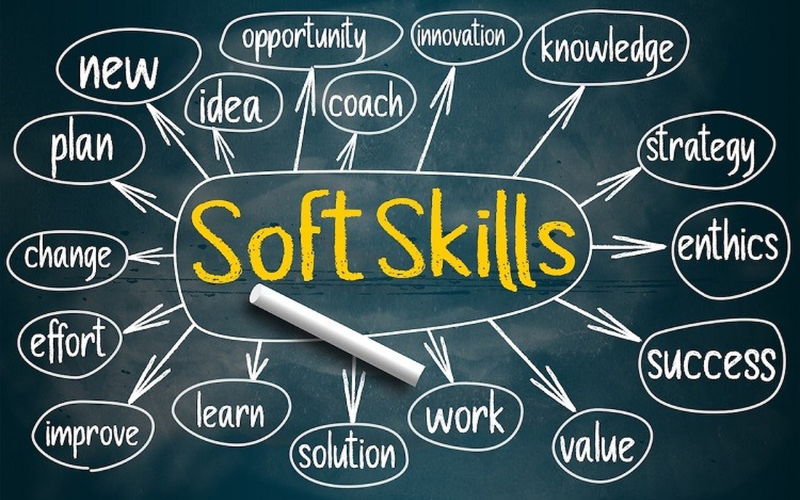
What are soft skills? Top 10 important soft skills to have
Soft skills are important factors that help you communicate effectively, handle situations and build sustainable relationships . Understanding and practicing these skills will not only help you stand out at work but also open up many opportunities for long-term career development. Let's find out how to practice these skills to develop your career!
I. What are soft skills?
Soft skills are the personal abilities and qualities that help each person communicate and work effectively with others. These are not technical skills that we learn from books or professional training programs but are often developed through social interaction, experience, and practice. Soft skills include many factors such as communication skills, leadership skills , problem-solving skills , time management , and more. They play an important role not only in work but also in everyday life.

For example, a person with good communication skills will know how to express ideas clearly and listen actively to others' opinions. Or an excellent leader will often be able to promote teamwork and resolve conflicts effectively.
II. The reality of soft skills possession among Vietnamese youth today
In Vietnam, many students and young people do not really focus on developing soft skills . The main reason is that the current education system still focuses on theoretical knowledge and grades rather than developing the necessary skills for life and work. As a result, when entering the working environment, many young people have difficulty in communication , teamwork, and problem solving.
However, some young people have begun to realize the importance of soft skills and their importance in improving career opportunities. Soft skills courses at universities such as UEH (Ho Chi Minh City University of Economics) are gradually gaining more attention. This is a good sign, but it needs to be further promoted so that soft skills become a factor that is focused on in the training and development process of the young generation.

III. The importance of soft skills in life
3.1 At work
- Improve work productivity : People with soft skills will know how to cooperate, communicate effectively and resolve conflicts quickly.
- Better Teamwork : Employees with good teamwork and communication skills tend to integrate more easily and achieve better results.
- Faster advancement : Employers not only value technical knowledge but also look for individuals with good soft skills to lead and motivate teams.
3.2 In life
- Building social relationships : Skills like communication and listening help people connect with each other, building deep relationships.
- Emotional Management : Practicing skills such as emotional intelligence and self-control helps each person manage difficult situations more calmly and tactfully.
- Personal development : Soft skills help each individual discover and improve themselves, thereby becoming a better version of themselves.

IV. Top 10 important soft skills for success
4.1 Communication skills
Communication skills are the foundation of all relationships, allowing you to convey information clearly, convincingly and understand others. Whether at work or in life, communication skills will help you reach consensus and avoid unnecessary misunderstandings.
4.2 Leadership
Leadership is not only for management positions but also necessary in everyday life. A good leader is someone who can inspire teamwork, make decisions and lead the team through challenges.
4.3 Problem solving skills
The ability to analyze and solve problems helps each individual deal with difficult situations quickly. People with this skill often have good critical thinking, do not panic when encountering problems and always find creative solutions.
4.4 Listening skills
Listening is not only a part of communication but also a crucial factor in building relationships. When you listen sincerely to others, you show respect and easily create trust.
4.5 Observation skills
Observation skills allow you to notice small changes in the environment around you, understand other people's emotions and respond appropriately. This is also one of the skills that helps detect and solve problems early.
4.6 Teamwork skills
Teamwork skills are skills that help you connect and cooperate with others. An effective working group will know how to coordinate the strengths of each member, thereby achieving a common goal.
4.7 Critical thinking skills
Critical thinking helps people look at information more deeply and objectively. It allows you to ask questions, evaluate data, and make informed judgments, rather than simply accepting the information that is available.
4.8 Time management skills
Time management skills help you organize your work scientifically, avoid wasting time on unnecessary things and achieve optimal performance.
4.9 Planning skills
Planning helps you define your goals and the steps to achieve them. This is an essential skill to turn ideas into concrete actions and avoid getting "lost" in your work.
4.10 Emotional management skills
Emotional management helps you control negative reactions, stay calm in all situations and create a good image in the eyes of others.

V. How to practice and develop soft skills
- Read books and take courses : This is the easiest way to start developing soft skills, especially for those who want to learn in depth and have the opportunity to practice.
- Practice regularly : Be proactive in communicating, working in teams and facing difficult situations to practice and improve your skills.
- Seek feedback from others : Listen to feedback from colleagues or friends to understand where you need to improve and plan appropriate adjustments.
- Get involved in social activities : Join clubs, volunteer organizations or training programs to practice and hone these skills.

VI. Distinguishing between soft skills and hard skills
Soft skills and hard skills are two important groups of skills that each individual needs to develop to achieve success in work and life. Understanding the difference between these two groups of skills helps us know how to maximize our potential in specific areas.
|
Element |
Soft skills |
Hard skills |
|
Concept |
Skills related to interaction and communication |
Skills related to professional knowledge |
|
Development method |
Develop through practice and experience |
Learning through classes and training courses |
|
Nature |
Difficult to measure, context dependent |
Can be measured specifically by criteria such as certification |
|
Role |
Increasingly important in the work environment |
Still plays an important role in the professional field |

VII. Brand Manager and the Importance of Soft Skills
In the field of brand management , soft skills play a key role in helping Brand Managers build brand image, manage teams, and interact effectively with customers. A Brand Manager not only needs professional knowledge but also must be proficient in communication , time management , and problem-solving skills to develop a sustainable brand in a competitive market.

Brand Managers are responsible for creating marketing strategies and managing brand identity to align with the long-term goals of the business. They ensure that every brand message is communicated consistently, from advertising to events. As a bridge between the business and customers, a good Brand Manager uses leadership skills to motivate the team to achieve goals, while incorporating creative thinking to shape public perception and maintain brand differentiation in a highly competitive environment.
